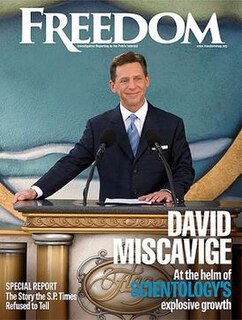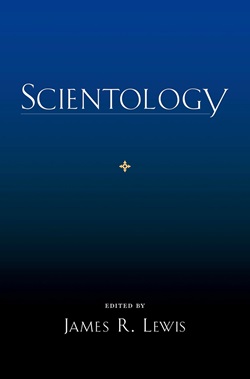
The Cult Awareness Network (CAN) was an organization created by deprogrammer Ted Patrick that provided information on groups that it considered to be cults, as well as support and referrals to deprogrammers. It was founded in the wake of the November 18, 1978, deaths of members of the Peoples Temple and assassination of Congressman Leo J. Ryan in Jonestown, Guyana, and was shut down in 1996. Its name and assets were later bought by a group of private donors in bankruptcy proceedings; with the transfer of ownership, the organization was renamed the New Cult Awareness Network.

A new religious movement (NRM), also known as alternative spirituality or a new religion, is a religious or spiritual group that has modern origins and is peripheral to its society's dominant religious culture. NRMs can be novel in origin or they can be part of a wider religion, in which case they are distinct from pre-existing denominations. Some NRMs deal with the challenges which the modernizing world poses to them by embracing individualism, while other NRMs deal with them by embracing tightly knit collective means. Scholars have estimated that NRMs number in the tens of thousands worldwide, with most of their members living in Asia and Africa. Most NRMs only have a few members, some of them have thousands of members, and a few of them have more than a million members.
The Church of Scientology maintains a wide variety of beliefs and practices. The core belief holds that a human is an immortal, spiritual being (thetan) that is resident in a physical body. The thetan has had innumerable past lives, some of which, preceding the thetan's arrival on Earth, were lived in extraterrestrial cultures. Based on case studies at advanced levels, it is predicted that any Scientologist undergoing auditing will eventually come across and recount a common series of events.

Since its inception in 1954, the Church of Scientology has been involved in a number of controversies, including its stance on psychiatry, Scientology's legitimacy as a religion, the Church's aggressive attitude in dealing with its perceived enemies and critics, allegations of mistreatment of members, and predatory financial practices; for example, the high cost of religious training:191 and perceived exploitative practices. When mainstream media outlets have reported alleged abuses, representatives of the church have tended to deny such allegations.

The Sea Organization is a Scientology organization, which the Church of Scientology describes as a "fraternal religious order, comprising the religion’s most dedicated members". All Scientology management organizations are controlled exclusively by members of the Sea Org. David Miscavige, the de facto leader of Scientology, is the highest-ranking Sea Org officer, holding the rank of captain.

John Gordon Melton is an American religious scholar who was the founding director of the Institute for the Study of American Religion and is currently the Distinguished Professor of American Religious History with the Institute for Studies of Religion at Baylor University in Waco, Texas, where he resides. He is also an ordained minister in the United Methodist Church and is a supporter of the controversial Remnant Fellowship Church.
Anson D. Shupe, Jr. was an American sociologist noted for his studies of religious groups and their countermovements, family violence and clergy misconduct. He was affiliated with the New Cult Awareness Network, an organisation operated by the Church of Scientology, and had at least one article published in Freedom magazine.

Stephen A. Kent is a professor in the Department of Sociology at the University of Alberta in Edmonton, Alberta, Canada. He researches new religious movements, and has published research on several such groups including the Children of God, the Church of Scientology, and newer faiths operating in Canada.

Bare-faced Messiah: The True Story of L. Ron Hubbard is a posthumous biography of Scientology founder L. Ron Hubbard by British journalist Russell Miller. First published in the United Kingdom on 26 October 1987, the book takes a critical perspective, challenging the Church of Scientology's account of Hubbard's life and work. It quotes extensively from official documents acquired using the Freedom of Information Act and from Hubbard's personal papers, which were obtained via a defector from Scientology. It was also published in Australia, Canada and the United States.

The Church of Scientology is a group of interconnected corporate entities and other organizations devoted to the practice, administration and dissemination of Scientology, which is variously defined as a cult, a business or a new religious movement. The movement has been the subject of a number of controversies, and the Church of Scientology has been described by government inquiries, international parliamentary bodies, scholars, law lords, and numerous superior court judgements as both a dangerous cult and a manipulative profit-making business. In 1979, several executives of the organization were convicted and imprisoned for multiple offenses by a U.S. Federal Court. The Church of Scientology itself was convicted of fraud by a French court in 2009, a decision upheld by the supreme Court of Cassation in 2013. The German government classifies Scientology as an anti-constitutional sect. In France, it has been classified as a dangerous cult. In some countries, it has managed to attain legal recognition as a religion.

Freedom is a magazine published by the Church of Scientology since 1968. The magazine describes its focus as "Investigative Reporting in the Public Interest." A frequent topic is psychiatry, which Scientology strongly opposes.

A Piece of Blue Sky: Scientology, Dianetics and L. Ron Hubbard Exposed is a 1990 book about L. Ron Hubbard and the development of Dianetics and Scientology, authored by British former Scientologist Jon Atack. It was republished in 2013 with the title Let's sell these people A Piece of Blue Sky: Hubbard, Dianetics and Scientology. The title originates from a quote of Hubbard from 1950; an associate of Hubbard's noted him saying that he wanted to sell potential members "a piece of blue sky".

The Scandal of Scientology is a critical exposé book about the Church of Scientology, written by Paulette Cooper and published by Tower Publications, in 1971.

Scientology: The Now Religion is a non-fiction book on Scientology, written by George Malko. The book was the first full-length analysis of the history surrounding the founding of the Church of Scientology, and L. Ron Hubbard. The author conducted interviews with members, and provides analysis about certain practices. The book was published in 1970 in Hardcover format by Delacorte Press, and then in a paperback edition in 1971, by Dell Publishing.
Scientology is a set of beliefs and practices invented by American author L. Ron Hubbard, and an associated movement. It has been variously defined as a cult, a business, or a new religious movement. The most recent published census data indicate that there were about 25,000 followers in the United States ; around 2,300 followers in England (2011); and about 1,700 in each of Canada (2011) and Australia (2016). Hubbard initially developed a set of ideas that he called Dianetics, which he represented as a form of therapy. This he promoted through various publications, as well as through the Hubbard Dianetic Research Foundation that he established in 1950. The foundation soon entered bankruptcy, and Hubbard lost the rights to his book Dianetics in 1952. He then recharacterized the subject as a religion and renamed it Scientology, retaining the terminology, doctrines, and the practice of "auditing". By 1954, he had regained the rights to Dianetics and retained both subjects under the umbrella of the Church of Scientology.
Kurt Weiland is a native of Austria and an executive in the Church of Scientology International. He is director of external affairs for the Church of Scientology's Office of Special Affairs, and Scientology's vice president of communications. He is a member of the organization's board of directors, and handles government, legal and public affairs for Scientology. He has often represented Scientology to the press as a media spokesman. Weiland works out of the Church of Scientology's offices in Los Angeles, California.

The Church of Scientology has operated in Germany since 1970. German authorities estimate that there are 4,000 active Scientologists in Germany as of 2020; the Church of Scientology gives a membership figure of around 12,000. The Church of Scientology has encountered particular antagonism from the German press and government and occupies a precarious legal, social and cultural position in Germany.
The intersection of Scientology and abortion has a controversial history which began with Scientology founder L. Ron Hubbard's discussion of abortion in his 1950 book Dianetics: The Modern Science of Mental Health. Hubbard wrote in Dianetics that abortion and attempts at abortion could cause trauma to the fetus and to the mother in both spiritual and physical ways. Scientologists came to believe that attempted abortions could cause traumatic experiences felt by the fetus, which would later be remembered as memories referred to in Scientology as "engrams". In the Scientology technique called Auditing, Scientologists are frequently queried regarding their sexual feelings and behaviors. These questions about Scientologists' sexual behavior are often posed to members during "security checks", a specific form of auditing sessions where individuals are required to document their divergence from the organization's ethics. One of the questions asked in these security checks is, "Have you ever been involved in an abortion?".
Jana Kathryn Riess is an American writer and editor.

Scientology is an edited volume about the Church of Scientology and the beliefs and movement called Scientology. It was edited by James R. Lewis, and published in March 2009 by Oxford University Press. In addition to Lewis, other contributors to the book include J. Gordon Melton, William Sims Bainbridge, Douglas E. Cowan, David G. Bromley, Anson Shupe, James T. Richardson, and Susan J. Palmer. Scientology gives an overview and introduction to the organization, and presents an analysis of the movement from the perspective of sociology. The book compares the organization to religious movements, and goes over its history of controversy. It delves into the practices of the organization and activities of its missions.













